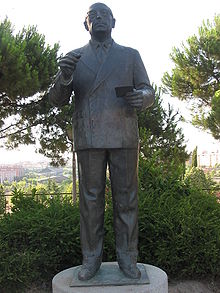Enrique Tierno Galván

Enrique Tierno Galván (born February 8, 1918 in Madrid , † January 19, 1986 ibid) was a Spanish political scientist, sociologist, lawyer and writer, doctorate in law and philosophy, professor of political law from 1948 to 1953 at the University of Murcia and from 1953 to 1965 at the University of Salamanca .
life and work
Tierno Galván made the first translation of Ludwig Wittgenstein's Tractatus and published on the picaresque novel , the historical novel and macrosociology . In addition, he wrote interesting delineations of western cultural history of the modern age (1964) and translated Edmund Burke's main work : Reflections on the Revolutions in France .
In 1957 he was charged with his political activities. In August 1965 he was finally expelled from the university because he supported the student protests against the Franco dictatorship together with Professors José Luis López Aranguren and Agustín García Calvo . In 1966 he accepted a position in the USA at Princeton University (1966–1967). He left the PSOE ( Partido Socialista Obrero Español ), which was only active underground due to the repression , because of different opinions and after his return to Spain in 1968 founded the PSI ( Partido Socialista del Interior ), which from 1974 called itself Partido Socialista Popular (PSP) . In the same year this party founds the United Democratic Party (JDE) together with the Communist Party (PCE), the Labor Party (PTE), the Carlist (PC) and various independent figures .
After Franco's death in 1975, he was returned to his chair in 1976. In the first democratic elections on June 15, 1977 , he became a member of the PSP's list of six members and joined the PSOE, of which he became honorary president in April 1978. In the first local elections in April 1979, he ran for the office of mayor of Madrid. Although his party did not get the most votes, he became mayor with the support of the Communist Party. Also with the support of the Communists, he kept the post from 1983 for a second term, which he held until his death in January 1986. In his nearly seven years as mayor, he initiated important reforms and gained great popularity. He wrote his demanding and ironic memoir Cabos sueltos in 1981. His political opponents, on the other hand, accuse him of distorting his personal career. The journalist César Alonso de los Ríos writes in his book The Truth About Tierno Galván (1997):
“Se inventó una personalidad soriana rural; una familia labradora imaginaria; una actividad militante en la guerra civil; una persecución política en la postguerra en contradicción con la brillantez de su carrera académica; una ideología marxista cuando aún estaba en una época que podríamos definir tecnocrática y regeneracionista; un supuesto republicanismo frente a su real monarquismo ... "
Nevertheless, with his humorous and well-written municipal edicts and initiatives that went into details such as the ducks on Manzanares and the public flower beds or that focused on the youth, he won broad affection from the Madrilenians. His support for the so-called Movida madrileña is particularly noteworthy. His funeral on January 21, 1986 was one of the largest gatherings in the Spanish capital.
The preamble to the Constitution of the Kingdom of Spain from 1978 , which he wrote, should also be emphasized .
translation
- in excerpts: Lorenz von Stein : Movimientos sociales y Monarquia. Instituto des estudios politicos, Madrid 1957 (German publication: History of social movements in France from 1789 to our days. 3 volumes. Leipzig 1850).
literature
- Antonio Machín Romero: Enrique Tierno Galván: del anarquismo a la alcaldía. Ediciones Lobohombre, Getafe 2004.
- Enrique Tierno Galvan , in: Internationales Biographisches Archiv 10/1986 of February 24, 1986, in the Munzinger Archive ( beginning of article freely available)
Web links
- Literature by and about Enrique Tierno Galván in the catalog of the German National Library
Footnotes
- ↑ He is also known as the Old Professor .
- ↑ Es famosa su frase en la que frivolizaba sobre el uso de las drogas: "¡Rockeros: el que no esté colocado, que se coloque ... y al loro!", 1984 at a music festival in the Madrid Sports Palace.
| personal data | |
|---|---|
| SURNAME | Tierno Galván, Enrique |
| ALTERNATIVE NAMES | Old Professor (nickname) |
| BRIEF DESCRIPTION | Spanish political scientist, sociologist, lawyer and writer |
| DATE OF BIRTH | February 8, 1918 |
| PLACE OF BIRTH | Madrid |
| DATE OF DEATH | January 19, 1986 |
| Place of death | Madrid |
